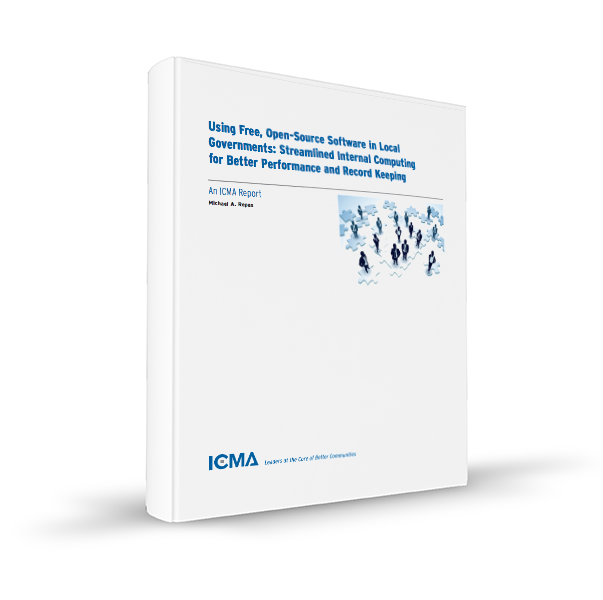The Importance of Using Free, Open-Source Tools in Local Government

Local governments often see limitations from their existing software. The systems often don’t connect processes in ways that make sense for the users, data is frequently not readily available and collaboration can be extremely challenging.
Given those limitations, local government departments have to turn to additional meetings, spreadsheets, etc. to supplement their tasks to make sure they’re completed correctly. If a local government can pinpoint the problem that they’re experiencing with the software, they have the opportunity to request changes or bug fixes. The fixes, however, may take months or years to find resolution – if they’re resolved at all – because the software provider employees are the only ones with access to the source code. More often than not, local governments have to simply pay for the upgrades or new versions that solve the issues.
Instead of accepting this fate, many forward-thinking local governments are looking to open-source software to get tasks done efficiently and free of cost. Open-source software (OSS) refers to any software in which the source code that the software runs on is freely available to the general population to improve as they like.
Using open-source software in local government is an excellent option for three main reasons: it’s cost effective, flexible and incredibly secure. Based on an insightful ICMA whitepaper, we’ll walk you through how some local governments are seeing these benefits already with open-source software.
- Cost-Effective
Government Technology estimates that Federal IT savings could reach $3.7 billion from open-source and said local government could expect similar or greater savings.
One common problem that IT professionals face is ensuring that they have the proper number of software licenses on hand during audits. Harold A. Schomaker is the IT manager and CIO of Largo, Florida. He said that if the city was fined for missing licenses, he could lose his job, so the city allocates additional funds to make sure they have enough extra licenses on hand. To avoid doing this for every piece of software the city uses, Largo uses as much free and open-source software as possible. This way, Largo doesn’t waste precious budget dollars and they avoid unnecessary fines. The typical IT department in local government is 3-4% of the entire budget. But in Largo, FL, their IT spending is only 1.3% of the city’s budget.
In October 2009, the city of Los Angeles adopted Google Apps, making it the second major U.S. city after Washington, D.C., to embrace the cloud-computing model. While only 17,000 of the 30,000 Los Angeles municipal government employees initially switched to Google Apps, the city saw early savings of approximately $13.8 million. If the estimate were to encompass archiving and video conferencing capabilities in Google Apps, Los Angeles could estimate a savings of nearly $50 million.
- Flexibility
In many local governments, one cost-savings strategy is repurposing old hardware. While this may sound incongruous with open-source software, it’s actually perfectly compatible. Flexibility is built into open-source software and it’s very easy to implement open-source software incrementally.
For example, many jurisdictions including Los Angeles as previously mentioned, have turned to Google Apps for versatile, free, open-source solutions for their jurisdictions. It doesn’t matter what computer or operating system your department is using. As long as the computer can connect to the internet, which has been the industry standard of computer replacement policies for years, employees can use Google Apps to their full potential. This enables departments to enjoy greater levels of collaboration and productivity without spending a dime on upgrading hardware or software.
- Secure
When looking at incorporating Google Apps into their jurisdiction, the Los Angeles city council’s biggest fear was security. They saw that much of the software was going to be based on servers at Google, not in-house in Los Angeles. After further research and discussions with Google, Los Angeles decided that Google’s security was actually stronger than the contemporary level of IT security for Los Angeles.
After Google Apps was implemented across the jurisdiction, CIO of Los Angeles Randi Levin said, “The move will save more than $5 million in hard costs and $20 million more through increased productivity.”
While the security fears were mitigated with Los Angeles’ use of Google Apps, some other open-source software may not provide the caliber of security that your jurisdiction requires. It’s important to discuss the security capabilities with the potential open-source provider before implementing it in your jurisdiction.
Depending on your jurisdiction and the particular needs of your department, there are many open-source solutions that could work. Here are some great examples:
- Google Apps is a robust, collaborative suite of apps. Use their email, video conference, online storage and file sharing. Google Documents is a great and free alternative to Microsoft Office, but the web-based suite allows for simple collaboration and real-time editing.
- Firefox is a free web browser that is more stable, versatile and effective than Microsoft Internet Explorer.
- Google Chrome is another free web browser that greatly surpasses the capabilities of Internet Explorer.
- Firebug is a piece of debugging software – one of the highest-quality – that works from within Firefox.
- WordPress is a free content management system that local governments can use to build websites and put other helpful information online. Because of the large variety of free plug-ins, WordPress gives users a great deal of control and configuration possibilities.
- GIMP is a photo-editing software that has more capabilities than Microsoft Paint without the fees of Adobe Photoshop.
Open-source software
If you’d like to learn more about what open-source software can do for your jurisdiction, download this whitepaper from our partners at ICMA or give us a shout and we’ll help you decide which open-source software might be best for your organization.
GovSense is the first complete cloud solution purpose-built for local governments, empowering over 60 communities and supporting more than 2 million citizens. Govsense built on Oracle NetSuite—the #1 true cloud ERP platform with over 50,000 customers worldwide— GovSense delivers a modern, unified system that streamlines operations, enhances transparency, and drives efficiency. GovSense’s team has been implementing cloud solutions since 2005, bringing over two decades of expertise in delivering scalable and secure technology for local agencies. As a five-time GovTech 100 recipient, we are recognized as an industry leader in transforming government technology. GovSense is one modern platform that has everything you need for your local government, ensuring your community is equipped with the tools to thrive in the digital age.

